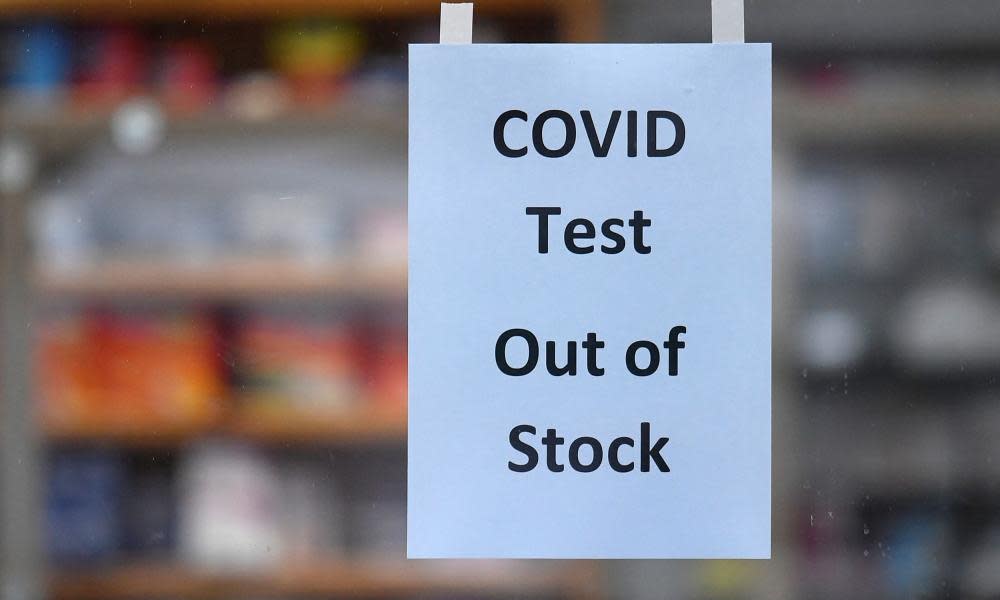Rapid antigen Covid test supplies to remain ‘bumpy’ over next two weeks

Obtaining rapid antigen tests over the next two weeks is likely to remain “bumpy” across Australia as supply chain issues cause shortages and price spikes.
Distributing the tests is something “still being worked out with the government”, the Pharmacy Guild of Australia has said.
The guild’s national president, Trent Twomey, said price rises were “coming from distributors and manufacturers who are paying extra to get stock to Australia, even chartering jets to get supplies here. Those costs are being passed on.”
• Sign up to receive an email with the top stories from Guardian Australia every morning
He said “the national shortage is due in part to the fact that the government’s pivot from PCR tests being the main testing regimen to RATs becoming the main one was done without warning so pharmacies could not order stock in preparation for the rush”.
Twomey said customers can expect more tests to be available by mid-January, but that the situation would remain “bumpy” in the meantime.
This comes as the Queensland government said it has secured 18m new rapid antigen tests, 12m of which will be for home testing and 6m for use in the hospital system.
The Queensland premier, Annastacia Palaszczuk, said the tests will arrive in “smaller numbers” in the short term, with a “large volume expected in late January”.
“Global demand for the test kits is significant and securing this supply will support new national protocols for close contacts and frontline workforces,” she tweeted.
Palaszczuk said the tests would be distributed for free at testing sites to close contacts and Covid positive patients, unlike in Victoria and New South Wales, where there is still confusion as to how the tests will be distributed.
The NSW premier, Dominic Perrottet, said on Friday that “vulnerable and disadvantaged communities” will have priority access to the 50m tests his government has ordered, but could not provide further details.
In Victoria, the health minister, Martin Foley, said residents can expect more rapid antigen tests to be made available in the “coming days”, after the government announced it had secured 34m kits in late December.
“We await the vagaries of the international air freight industry, but our expectation is in the coming days of this week, the first initial arrival of those rapid antigen tests will begin to arrive,” he said.
Foley said the state government was “working” on the distribution model for the tests, mentioning the need to get the kits to vulnerable Victorians, but did not provide any details on how that would work.
“Clearly, until such a time as we get really significant consistent supplies across both government-provided services and other services, they will be in short supply,” he said.
Email: sign up for our daily morning briefing newsletter
App: download the free app and never miss the biggest stories, or get our weekend edition for a curated selection of the week's best stories
Social: follow us on YouTube, Facebook, Instagram, Twitter or TikTok
Podcast: listen to our daily episodes on Apple Podcasts, Spotify or search "Full Story" in your favourite app
Foley said he believed the distribution of the tests will be discussed at the national cabinet meeting on Wednesday.
The prime minister, Scott Morrison, announced earlier on Monday that the tests would not be made free, but the federal government was working on concessional arrangements, split 50-50 with the states.
The federal treasurer, Josh Frydenberg, defended the government’s approach to the distribution of the tests, saying the government had already paid $2.5bn for free PCR tests.
“We can’t make every product for free. What we do is provide it to those most vulnerable in those settings and particularly the aged care system, and working through the public health orders to meet the costs with the states on a 50-50 basis,” he said on ABC News Breakfast.
“Significant amounts of rapid antigen tests are making their way to Australia.”

 Yahoo News
Yahoo News 
